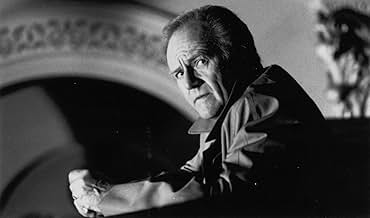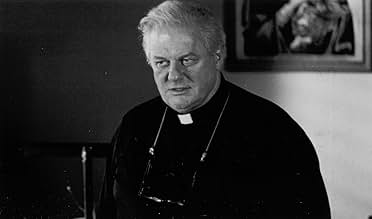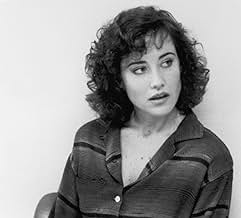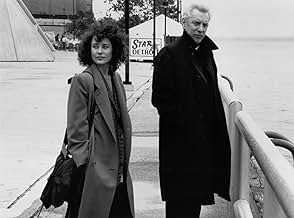NOTE IMDb
5,8/10
1,9 k
MA NOTE
Ajouter une intrigue dans votre langueA priest is put in a dilemma when the serial killer who has been murdering priests and nuns confesses to him.A priest is put in a dilemma when the serial killer who has been murdering priests and nuns confesses to him.A priest is put in a dilemma when the serial killer who has been murdering priests and nuns confesses to him.
- Réalisation
- Scénario
- Casting principal
- Récompenses
- 2 victoires au total
Avis à la une
As slow-burns go, Fred Walton's mysterious catholic-bounded thriller takes the cake with its minimal and sombre treatment. It's one of those progressive and morally hounded plots (from William X. Kienzle's novel), which is a puzzle to decipher, as you find yourself also personally getting involved with the brooding investigation with realistic characters. Some of the scheming is a bit hard to swallow, but for most part it's smartly penned (by Elmore Leonard and Fred Walton) and the low-key approach seems to make you concentrate on the lyrical waxing (especially on those commitments to the priesthood and the self-doubting). However the pacing seemed to plod a bit too much, where some monotonous patches seemed to lose focus. Two stalwart figure heads; an impressive Donald Sutherland and equally so Charles Durning are engagingly strong. Sutherland has a sincere presence about him, that even if he looks half-asleep. He's still watchable. Josef Sommer and Belinda Bauer offer able support. Walton's direction is slickly presented, but feels shapeless and dry. At least he did construct a subtle, startlingly dreary atmosphere and the music score etches out a placidly haunting vibe. The violence happened mostly off-screen, but managed to leave a chilling mark and the Detroit setting complements the weary imprint. A sleepy and glum, but well-acted and rather moving thriller.
Donald Sutherland plays Father Robert Koesler, a priest in Detroit who hears the confession of a murderer who is going around offing various priests and nuns. After doing some amateur sleuthing, Koesler figures out who the killer is. But he's bound by church law to say nothing. His superiors - among them, the hard nosed, conservative Ted Nabors (Charles Durning) - believe that nothing can violate the sanctity of the confessional. So, as you can guess, Koesler is a very troubled man. Koznicki (Josef Sommer), the detective on the case, is not as concerned with the rules of the Catholic church, aiming to catch himself a killer.
This sure sounds like a neat premise for a thriller, but on the whole the story isn't told in a particularly interesting way. The subplot of a potential romance, between Koesler and Pat Lennon (a reasonably appealing Belinda Bauer), really doesn't add anything to the material. Fred Walton ("When a Stranger Calls" '79, "April Fool's Day" '86) directs with competence and gives the proceedings a very somber quality. On location shooting ("The Rosary Murders" was actually filmed in Detroit) helps a bit, although the story doesn't exactly hold any surprises. (The killer turns out to be a truly disgusting piece of work.) That's too bad, considering that the two credited screenwriters are director Walton and the great author Elmore Leonard. There is a moment around the one hour mark that struck this viewer as simply too hard to swallow.
There are some solid actors and familiar faces among the cast: Anita Barone, Rex Everhart, Stefan Gierasch, Tom Mardirosian, Mark Margolis, James Murtaugh, Lupe Ontiveros, Addison Powell. But the movie is anchored the most by Sutherland, who plays Koesler as an easygoing, likable chap with a fairly progressive and compassionate attitude.
He and Durning manage to make this worth seeing.
Six out of 10.
This sure sounds like a neat premise for a thriller, but on the whole the story isn't told in a particularly interesting way. The subplot of a potential romance, between Koesler and Pat Lennon (a reasonably appealing Belinda Bauer), really doesn't add anything to the material. Fred Walton ("When a Stranger Calls" '79, "April Fool's Day" '86) directs with competence and gives the proceedings a very somber quality. On location shooting ("The Rosary Murders" was actually filmed in Detroit) helps a bit, although the story doesn't exactly hold any surprises. (The killer turns out to be a truly disgusting piece of work.) That's too bad, considering that the two credited screenwriters are director Walton and the great author Elmore Leonard. There is a moment around the one hour mark that struck this viewer as simply too hard to swallow.
There are some solid actors and familiar faces among the cast: Anita Barone, Rex Everhart, Stefan Gierasch, Tom Mardirosian, Mark Margolis, James Murtaugh, Lupe Ontiveros, Addison Powell. But the movie is anchored the most by Sutherland, who plays Koesler as an easygoing, likable chap with a fairly progressive and compassionate attitude.
He and Durning manage to make this worth seeing.
Six out of 10.
The author has relied heavily upon the literary device of COINCIDENCE in constructing his plot; i.e., he expects you to believe that several people living in the same part of the country would have certain proper names. I'd love to explain that in detail, but doing so would ruin part of the ending. Rent this movie and see if you agree. But this flaw will not diminish your enjoyment of the film, as there is enough action to keep the murder mystery fan happy. I was never bored during any of the times I watched this film. I recommend this any day of the week.
Murder mysteries generally speaking are criminal fantasies, outside of those based on real-life or so-called true crime. "The Rosary Murders" is based on a neo-noir novel by William X. Kienzle who was a real catholic priest. The story involves a series of murders associated with people in the catholic church, some laymen/laywomen while others are clergy. The murderer leaves behind a rosary. Donald Sutherland plays Father Koesler, a sort of priest-turned-detective. Also, at one point, the murderer confesses to the Koesler and he has to decide if he should break the church law of keeping confession confidential.
Typically, civilians outside of law enforcement are not supposed to engage in their own investigations of a crime being handled by the police. However in this story Father Koesler is given a lot of leeway to explore the case and interview witnesses. It turns out there's a backstory involving a nun who has entered into a cloistered convent where she has taken vows of silence. Koesler realizes she knows something crucial to the case.
Overall, I didn't find this film very entertaining. It was interesting, but also very gruesome and the overall feel was almost so real it was verging on not being terribly entertaining. Strangely films like "The Silence of the Lambs", though gruesome, are compelling from beginning to end. I didn't find that true with this film. Compelling but not really entertaining, and if it's not entertaining, what's the point?
Typically, civilians outside of law enforcement are not supposed to engage in their own investigations of a crime being handled by the police. However in this story Father Koesler is given a lot of leeway to explore the case and interview witnesses. It turns out there's a backstory involving a nun who has entered into a cloistered convent where she has taken vows of silence. Koesler realizes she knows something crucial to the case.
Overall, I didn't find this film very entertaining. It was interesting, but also very gruesome and the overall feel was almost so real it was verging on not being terribly entertaining. Strangely films like "The Silence of the Lambs", though gruesome, are compelling from beginning to end. I didn't find that true with this film. Compelling but not really entertaining, and if it's not entertaining, what's the point?
I like religious horror and giallos. For example one of my favorite horror films is Alice Sweet Alice, I think The Exorcist is a well-written drama, and I lean towards the Italian films with spiritual or religious imagery. The Rosary Murders deals with a lot of complex issues in the Catholic church, someone might argue the plot of this film is absurd, but it's not. A priest cannot tell on a child rapist or a serial killer even if they confess. One of the reasons I am giving this flick a solid six is because it attempted to confront these kinds of issues head-on, as well as other problems like overly focusing on sexuality in the American conservative churches to the point of insanity, and the mandatory celibacy of priests.
But to see Donald Sutherland in this film a scant fifteen years after the epic supernatural giallo, Don't Look Now, is a little sad. The Rosary Murders would have been so much better handled by a director with a better eye, who actually understood lighting and atmosphere and editing techniques. Instead, this movie looks like it could have been made for tv, and I consider it a stylistic flaw when handling this kind of subject matter. No one wants to watch a movie about religious murders that looks like an episode of Hill Street Blues.
But to see Donald Sutherland in this film a scant fifteen years after the epic supernatural giallo, Don't Look Now, is a little sad. The Rosary Murders would have been so much better handled by a director with a better eye, who actually understood lighting and atmosphere and editing techniques. Instead, this movie looks like it could have been made for tv, and I consider it a stylistic flaw when handling this kind of subject matter. No one wants to watch a movie about religious murders that looks like an episode of Hill Street Blues.
Le saviez-vous
- AnecdotesFilmed in part on location at Most Holy Redeemer Catholic Church in Southwest Detroit.
- GaffesA priest is called to the confessional from his quarters in the church. He walks across the altar to reach the confessional without genuflecting in front of the altar.
- Citations
Father Edward Killeen: Break the seal of confession, and you destroy the Church.
Father Robert Koesler: People are going to die.
Father Edward Killeen: You're saving souls Bob, not lives.
- ConnexionsReferenced in Père et fille (2004)
- Bandes originalesIN YOUR EYES
Recorded & Sung by Nancy Wood
Composed by Bobby Laurel
Lyrics by Bobby Laurel & Dennis Leahy
Based on an adaptation of the Third Symphony written by Johannes Brahms
Meilleurs choix
Connectez-vous pour évaluer et suivre la liste de favoris afin de recevoir des recommandations personnalisées
- How long is The Rosary Murders?Alimenté par Alexa
Détails
- Date de sortie
- Pays d’origine
- Langue
- Aussi connu sous le nom de
- The Rosary Murders
- Lieux de tournage
- Dearborn, Michigan, États-Unis(scenic overview of the industrial area)
- Sociétés de production
- Voir plus de crédits d'entreprise sur IMDbPro
Box-office
- Montant brut aux États-Unis et au Canada
- 1 730 337 $US
- Montant brut mondial
- 1 730 337 $US
- Durée1 heure 45 minutes
- Couleur
- Mixage
- Rapport de forme
- 1.85 : 1
Contribuer à cette page
Suggérer une modification ou ajouter du contenu manquant





























